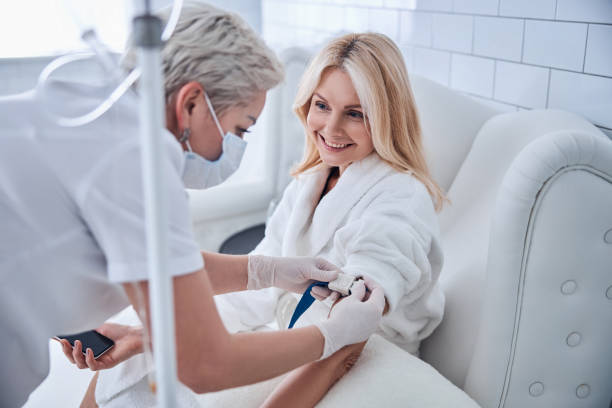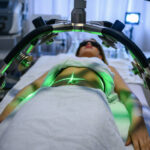Introduction: The Hidden Struggle of Postpartum Hair Loss
In the shimmering city of Abu Dhabi, where women balance the demands of motherhood with careers, social obligations, and cultural expectations, physical appearance often plays an integral role in confidence and identity. One of the most emotionally jarring postpartum experiences for many new mothers is sudden hair loss. Scientifically referred to as telogen effluvium, this condition typically emerges several months after childbirth when hormone levels shift dramatically. Although it’s a natural physiological response, it can deeply affect a woman’s self-esteem. As women seek effective, non-hormonal solutions that align with their postnatal recovery goals, Platelet-Rich Plasma (PRP) therapy has quietly become a preferred treatment among Abu Dhabi’s educated and wellness-conscious mothers.
Why Postpartum Hair Loss Happens
Postpartum hair loss is a delayed reaction to the dramatic drop in estrogen following delivery. During pregnancy, elevated hormone levels prolong the hair growth (anagen) phase, making hair appear thicker and fuller. However, after childbirth, hormone levels normalize rapidly, pushing more follicles into the shedding (telogen) phase. The result is sudden, diffuse hair loss that typically peaks three to four months postpartum. For many women, this timing coincides with returning to public life, resuming work, or managing social commitments—all of which can amplify the emotional distress caused by visible thinning. In response, many are turning to PRP Hair Treatment in Abu Dhabi as a safe, regenerative solution to accelerate recovery and restore volume without relying on medication or invasive procedures.
In Abu Dhabi’s culture, where polished presentation and grooming are emphasized, the loss of hair can carry deeper implications. Whether it’s tied to a sense of femininity, privacy, or societal standards, postpartum hair loss often becomes a hidden source of anxiety for new mothers, who are already adjusting to profound physical and emotional changes.
PRP Therapy: A Natural, Regenerative Option
Platelet-Rich Plasma therapy is a minimally invasive treatment that uses a patient’s own blood components to stimulate tissue repair and follicle regeneration. After drawing a small amount of blood, it is centrifuged to isolate the platelet-rich layer, which contains concentrated growth factors. These growth factors are then injected directly into the scalp in areas of thinning or shedding, activating dormant follicles and improving blood circulation.
For postpartum women, PRP offers a drug-free, biologically safe option that doesn’t interfere with breastfeeding or hormonal balance. Unlike topical treatments that may contain harsh chemicals or oral medications that aren’t compatible with lactation, PRP appeals to new mothers looking for clean, body-compatible healing. Clinics across Abu Dhabi have taken note of this shift, quietly expanding their PRP offerings to include protocols tailored specifically for postpartum hair restoration.
The Discreet Rise of PRP Among New Mothers in Abu Dhabi
Though not always publicly discussed, the demand for postpartum PRP treatments has grown steadily in Abu Dhabi’s upscale districts such as Al Reem Island, Khalifa City, and Saadiyat. Many women prefer to keep their hair restoration efforts private, often scheduling PRP appointments in boutique clinics with private entrances, flexible appointment hours, and gender-segregated facilities. The nature of PRP—being subtle, natural, and involving no dramatic immediate changes—makes it especially appealing for mothers who wish to enhance their appearance without drawing attention or undergoing invasive procedures.
Word-of-mouth referrals, women-only wellness forums, and discreet social media influencers have all played a role in building awareness around PRP for postpartum recovery. In a society that values discretion and modesty, PRP fits seamlessly into a narrative of personal care, healing, and quiet rejuvenation.
Customizing PRP for the Postpartum Scalp
One of the hallmarks of high-quality PRP treatment in Abu Dhabi is personalization. Postpartum hair loss does not manifest the same way in every woman. Some experience widespread thinning along the crown; others notice patchy hairline recession or temple balding. Factors like genetics, nutrition, iron levels, and stress all influence how a woman’s scalp responds post-birth.
Clinics in Abu Dhabi increasingly offer digital scalp mapping and hormone-sensitive diagnostic panels before initiating PRP. These diagnostics help determine whether the hair loss is purely postpartum or mixed with early androgenetic alopecia, vitamin deficiency, or thyroid imbalance. Treatment is then customized in terms of injection depth, session frequency, and post-care. For lactating mothers, special consideration is given to aftercare protocols, ensuring that any topical adjuncts are entirely safe and free from contraindicated ingredients.
PRP and Emotional Recovery: Reclaiming Confidence After Birth
Beyond its physical benefits, PRP therapy can have a profound psychological impact on postpartum women. The act of investing in one’s recovery and appearance after childbirth can foster a renewed sense of agency and confidence. In a time when many new mothers feel depleted, anxious, or overwhelmed, seeing improvement in hair volume and thickness can be deeply affirming.
Abu Dhabi’s PRP clinics have recognized this psychosocial dimension and often create nurturing environments specifically for postpartum clients. Private treatment suites, calming ambiance, postpartum-friendly refreshments, and even integrated wellness therapies like scalp massage or aromatherapy are offered. The goal is not just to inject plasma—but to hold space for the mother’s holistic recovery. This patient-centered approach contributes to PRP’s growing reputation as more than a cosmetic solution—it becomes an act of emotional self-care.
Integration with Postnatal Wellness Programs
Leading wellness centers and maternity clinics in Abu Dhabi have begun integrating PRP into comprehensive postpartum care programs. These packages may include nutritional counseling, pelvic floor therapy, lactation support, and aesthetic treatments. For new mothers attending postnatal checkups, PRP is now being introduced not just as an elective, but as a supported therapeutic option for addressing visible hair loss.
In many cases, PRP is paired with IV nutrient therapy, iron optimization, and herbal scalp treatments to create a multi-layered recovery protocol. Some luxury clinics even provide at-home nurse visits for PRP treatments, allowing mothers to receive care without disrupting their newborn routines. This level of accessibility and personalization is a testament to how Abu Dhabi’s healthcare ecosystem is evolving to meet the needs of modern motherhood.
Safety Considerations and Clinic Selection
Despite its regenerative reputation, PRP is a medical procedure that should only be performed by trained professionals. For postpartum women, selecting the right clinic is crucial. In Abu Dhabi, regulatory oversight ensures that only licensed medical facilities can offer PRP. Still, not all providers offer the same level of safety, sterility, or diagnostic rigor.
Top clinics use double-spin centrifuge systems to isolate the most potent platelet concentrations and maintain sterile environments for injection. Mothers are also advised to ensure that the procedure is supervised by dermatologists or aesthetic physicians with experience in postnatal physiology. This helps avoid complications such as inflammation, improper injection depth, or misdiagnosis of underlying conditions.
Future Outlook: Normalizing the Conversation Around Postpartum Aesthetics
As awareness around postpartum mental health and physical recovery grows, PRP is poised to become a mainstream part of aesthetic wellness for mothers in Abu Dhabi. The current silence around hair loss is gradually giving way to informed dialogue, thanks to empathetic healthcare providers and a new generation of women openly discussing their challenges and choices.
Future developments may include hormone-adaptive PRP formulations, AI-assisted follicle monitoring, and even genetic profiling to predict who is more likely to experience postpartum shedding. As these innovations unfold, the core appeal of PRP—its natural, body-harmonious healing—will remain central to its success among mothers navigating the delicate balance between personal identity and motherhood.
Conclusion: Regrowth, Reconnection, and Renewal
For the new mothers of Abu Dhabi, PRP therapy offers more than a cosmetic fix—it represents a reconnection with self, a step toward regaining control in the transformative journey of motherhood. By restoring hair, it helps restore confidence. By offering safe, tailored care, it honors the postpartum experience. And by doing so discreetly and effectively, PRP is emerging as one of the most trusted silent allies in the city’s evolving maternal wellness landscape. As this trend grows, it reflects a deeper cultural shift—one that embraces maternal beauty, renewal, and dignity, on a woman’s own terms.


